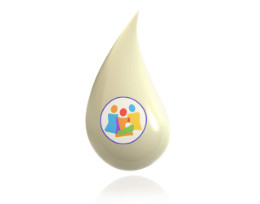Solid Foods for the Human Milk-Fed Infant
When should I start feeding my child solid foods?
Human milk meets all of your baby’s nutritional needs until 6 months of age. The best time to introduce solid foods is at 6 months of age. Research has shown that babies have a lower risk of wheezing, colds, and diarrhea if they wait until 6 months to start solids. Studies have also shown that solid foods such as rice cereal won’t help your baby sleep through the night. By 6 months, most babies will show signs of readiness to start solids – including sitting with some support, watching you eat, and reaching for the spoon or the plate.
Breastfed infants need high-iron solids because the iron in breastmilk is harder to absorb once infants start on solids, and the amount of iron in breastmilk might not be sufficient for some babies past 6 months. Many foods are high in iron, particularly meat, legumes such as beans, peas and lentils, and dark leafy vegetables such as kale and spinach. Dried fruits such as prunes, dates and raisins are also high in iron and can be stewed to soften, then pureed. All of these can be first foods for infants. See the section on Iron below.
Generally, it is best to introduce no more than 1 new food every 2-3 days, in order to watch for allergic reactions, such as rashes, facial swelling, hives, or vomiting and diarrhea.
What types of foods should I feed my child?
- Cereals: Cereals should not be given in the baby’s bottle, but rather as a solid food. Iron- fortified cereals are preferred. The cereals do not need to be introduced in any particular order. Rice cereal (even organic rice) is high in arsenic, so it is recommended to limit rice cereal to no more than 2 servings a week. Offer a variety of iron-fortified cereals instead, such as quinoa, barley, and oats.
- Vegetables and fruit: The order in which you add vegetables and fruits to your baby’s diet is not important. Fresh produce is ideal, but frozen vegetables and fruits are healthy as well.
- Meat and protein alternatives: At 6 months of age your baby is ready for pureed meats and protein alternatives (such as beans, peas, lentils, tofu, cottage cheese, and yogurt).
- Foods that can cause allergies: Foods that are known to cause allergies, such as fish, nuts, peanuts, and eggs, should be introduced by 6-7 months of age to reduce the risk of food allergies. Waiting until 9-12 months actually increases the risk of food allergies. If your infant already has evidence of allergies, such as eczema or wheezing, or if there is a strong family history of food allergies, talk to your infant’s physician before introducing these foods.
- Most breastfeeding infants continue to nurse 4-8 times a day when starting solids. Infants usually nurse in the am before breakfast, between breakfast and lunch, after lunch, in the mid-afternoon, before and/or after dinner, and often a few times in the evening. Most infants still wake one more times at night to feed.
- Consider offering breastmilk in a cup at mealtime, to help your infant build cup-feeding skills.
- As babies approach 9 months and are eating hearty meals three times a day with a few snacks in between, they will often decrease nursing to 4-5 times day. The pattern of nursing can be quite variable for every mother-infant pair, but generally infants still need to nurse at least 4 times a day for proper nutrition until at least 1 year of age.
Are there foods I should not feed my child?
- Do not give your child raw honey during the first year of life, due to the risk of botulism.
- Juice is not considered healthy for infants or toddlers, due to its high sugar content.
- It is recommended to limit water to 4-6 ounces a day until 1 year of age. Instead, babies should have breastmilk or formula as their main fluid.
- Foods should be cut, softened or avoided to prevent choking. The most common foods that cause choking in young children include peanuts, popcorn, raisins, fruits with pits, hard candies, whole chunks of hot dogs, raw vegetables, whole grapes, whole olives.
- Cow’s milk should not be a substitute for human milk until at least one year of age, but other dairy products may be added at 6 months, such as yogurt and cheese.
How do I feed my child?
- Babies can typically join in at family meal times starting at 6 months.
- Baby-led weaning is a popular way to encourage independence in eating and to enable babies to self regulate their intake. Babies can typically join in with the foods their families are eating with the caveat to avoid any choking hazards (see above). Babies pick up their own food to feed themselves, rather than rely on spoon feeding. More information is available at babyledweaning.com.
- If you are spoon-feeding your infant, introduce the spoon towards the front of the mouth. Babies who are learning to take solids sometimes will tongue-thrust the food out of their mouths. After a short time of practicing, this will resolve.
- Most children want to feed themselves with their fingers by 9 months of age, and they will refuse spoon-feeding. They should be encouraged to feed themselves. At 12 months of age, most children do not need pureed baby foods. By 15 to 18 months of age, most children can feed themselves with a spoon and no longer need a parent’s help to eat.
Should I give my child snacks?
Once your baby eats 3 meals a day or at 5-hour intervals, he may need small snacks to tide him over between meals. Most babies begin this pattern between 6 and 9 months of age. The midmorning and mid-afternoon snack should be nutritious food that would be typically given at a meal. If your child is not hungry at mealtime, cut back on the snacks or eliminate them.
Can my child eat table food?
Your child should be eating the same meals you eat by approximately 1 year of age. This assumes that your diet is well balanced and that you carefully dice any foods that would be difficult for your baby to chew. Avoid foods that he could choke on such as raw carrots, candy, peanuts or other nuts, and popcorn, as above.
What foods contain iron?
Throughout our lives we need iron in our diet to prevent anemia. Certain foods are especially good sources of iron. Red meats, fish, and poultry are all good sources of iron. Iron-enriched cereals, beans and legumes, egg yolks, peanut butter, raisins, prune juice, sweet potatoes, and spinach are also good sources of iron. Adding citrus, such as lemon juice, orange slices, or tomato can improve iron absorption from these foods.
Does my child need vitamins?
After your child is 1 year old and is eating a balanced diet, 400 units of vitamin D is usually the only vitamin needed, unless otherwise directed by your physician. Some children may need added iron at 9-12 months of age. If your child is a very picky eater, a multivitamin is fine.


